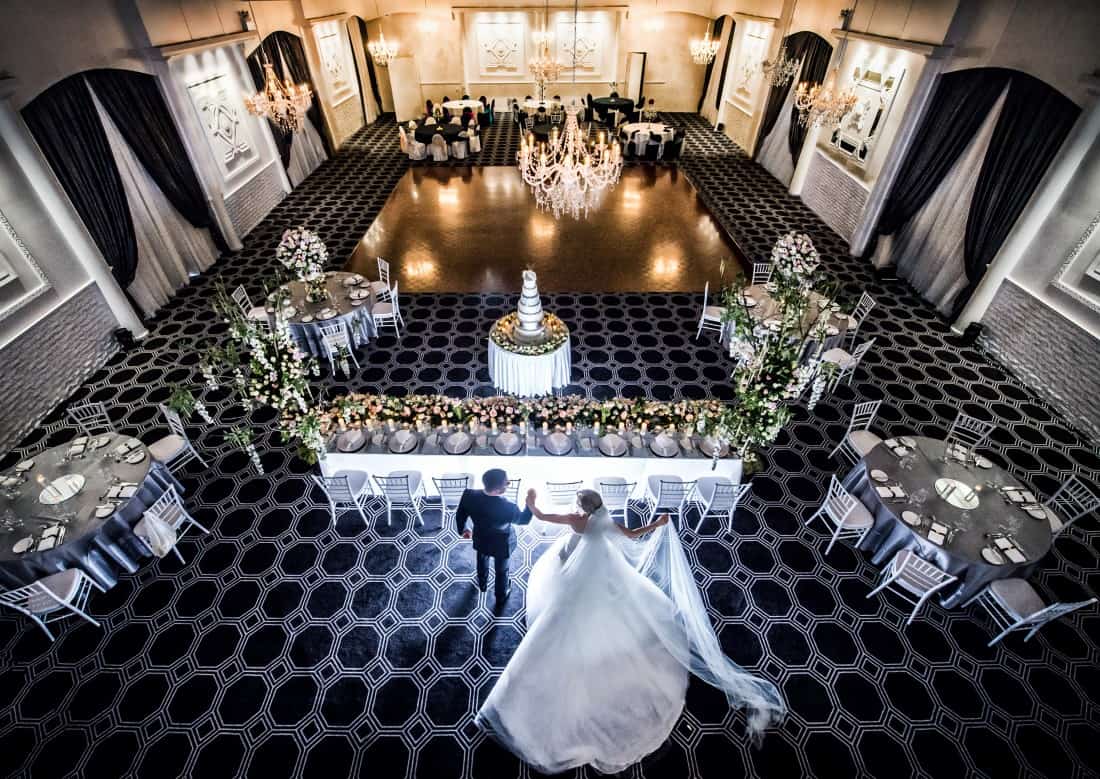Weddings are full of decisions, from the venue to the guest list to the cake flavour, but one topic that often gets overlooked — yet is just as important — is figuring out who will cover the honeymoon costs. As a wedding expert, I’ve seen firsthand how this question can lead to some awkward conversations and even tension between families, especially when expectations don’t match up with reality.
When I got married at Vogue Ballroom in 2017, my partner and I found ourselves in a similar situation. We were in our late 30s, living together for a few years already, and financially independent. So, the whole idea of a traditional honeymoon payment seemed, well, a bit outdated for us. But then, how do you navigate this delicate topic with your families? And what’s the right etiquette for covering these expenses?
The truth is, the answer to who pays for the honeymoon has evolved over time, with a significant shift from traditional practices to more modern approaches. These days, many couples in Melbourne (and beyond) are looking for a more flexible way to handle honeymoon costs, one that reflects their personal financial situation and family dynamics.
So, let’s tackle into this age-old question: Who typically pays for the honeymoon?
Honeymoon Expenses by Tradition vs. Modern Practices: What You Need to Know
As you plan your wedding and honeymoon, it’s essential to understand the divide between traditional expectations and modern practices when it comes to honeymoon funding. While some couples still adhere to old-fashioned rules, the reality is that most couples today are crafting their own path. This isn’t just about who pays for what; it’s about blending family traditions, personal preferences, and financial realities to create the honeymoon of your dreams.
How to Balance Tradition and Modern Practices
As much as traditions hold sentimental value, it’s important to remember that every couple is different. For example, I once worked with a couple who were deeply committed to keeping their heritage alive. The groom’s family wanted to cover the honeymoon costs, as is traditional in their culture. However, the couple was modern and financially independent, and they preferred to split the costs evenly.
After some discussion, they found a middle ground. The groom’s family paid for a luxurious part of the honeymoon — a five-star resort in the Maldives — while the bride and groom funded the rest of their trip. This balance between tradition and modern practicality allowed them to honour their family’s wishes while staying true to their own financial independence.
This flexibility is key in today’s wedding world. There’s no one-size-fits-all solution to paying for the honeymoon. Instead, couples are blending elements from both traditional and modern approaches to make decisions that work for them.
Cultural Influences on Honeymoon Costs
Cultural background can play a big role in how honeymoon costs are shared. Some cultures maintain the traditional approach where the groom’s family handles the entire honeymoon, while others may split the expenses more evenly. For instance, couples with strong ties to certain cultures may still follow the “groom’s family pays” rule, while others might opt for a more egalitarian approach.
Take, for example, one couple I worked with who had a destination wedding in Bali. The groom’s family was keen to stick to tradition, and they offered to cover the honeymoon costs in full, including the lavish resort stay and all-inclusive experience. However, the bride and groom decided to split some of the costs as well, to ensure that the honeymoon felt like a joint celebration rather than a gift from one side.
This situation is not uncommon, and it shows that even when family traditions play a role, couples have the flexibility to balance those expectations with their own preferences.
Creative Ways to Fund Your Honeymoon Without Breaking the Bank
While some couples may still rely on traditional methods, many modern couples are coming up with creative solutions to fund their honeymoon without straining their finances. The last thing you want is to start your married life with honeymoon-related debt hanging over your head, so finding smart ways to cover the costs can make all the difference.
I’ve seen a number of couples come up with unique ways to fund their dream getaway. Here are some strategies that are becoming increasingly popular:
Honeymoon Registries: The Modern Wedding Gift
One of the most significant changes in wedding etiquette over the last decade is the rise of honeymoon registries. Instead of asking for more china or toasters, couples are now asking their wedding guests to contribute to their honeymoon fund. It’s a practical, thoughtful, and sometimes even sentimental way for guests to participate in the couple’s journey.
When we got married, my partner and I decided to go this route. We created a honeymoon fund where guests could contribute to specific activities, like a sunset cruise in Fiji or a romantic dinner on the beach. It was incredibly well-received, as it allowed guests to gift something memorable rather than simply giving cash or physical items. And, just like many couples, we appreciated that we could pick out the exact experiences we wanted for our trip.
So, how do honeymoon registries work?
- How They Work: Guests can contribute directly to a honeymoon fund, which is typically managed through online platforms like Honeyfund, Traveler’s Joy, or Joy. These platforms allow you to list your honeymoon destination and specific experiences (e.g., spa day, helicopter ride, or sightseeing tour), and guests can choose which activities to sponsor.
- Setting Up: You can set up your registry early on in the planning process. Make sure to include specific details about your honeymoon — the destination, the kind of experiences you’re hoping to have, and the types of activities you want to enjoy. This gives guests a clear picture of where their money is going.
- Etiquette: It’s important to note that a honeymoon registry should be treated like any other wedding registry. Include the details of the honeymoon fund on your wedding website, but avoid mentioning it directly on the invitation itself. It’s considered poor etiquette to make the registry feel like an obligation. Instead, treat it like a gift option for those who want to contribute, with various price points for guests to choose from.
Many couples find honeymoon registries to be a great way to help fund a dream trip without burdening family members or cutting into their savings.
Smart Saving and Budgeting for Your Dream Honeymoon
As much as I love the idea of honeymoon funds, there’s something to be said for planning and saving well in advance. By creating a dedicated honeymoon savings account, you can spread the cost of your trip over several months, making the financial burden less overwhelming.
Take it from me — starting a dedicated savings account is one of the best moves you can make. If you’re planning a big honeymoon trip, you’ll need to set a clear budget, estimate the costs of flights, accommodation, meals, and activities, and then decide how much you can realistically save each month leading up to the wedding. The more time you give yourself, the easier it will be to afford your dream honeymoon without putting stress on your other wedding costs.
One way to save even more is by booking your honeymoon during off-peak times. For example, travelling to Bali in the middle of the rainy season might not sound ideal, but it’s a fraction of the price compared to going during the peak tourist season. As you know, costs for flights and hotels can skyrocket in peak season, so choosing an off-peak period can save you thousands.
Using Wedding Gifts for Your Honeymoon
Another smart way to fund your honeymoon is by putting your wedding gifts to good use. If you’re lucky enough to receive cash or cheques as part of your wedding gifts, consider allocating those funds towards your honeymoon. When we received cash gifts, we set aside a portion of it specifically for our honeymoon — and it made a big difference in allowing us to enjoy our trip to the fullest.
What’s great about this approach is that it doesn’t require any extra effort from your guests; they’re already planning to give you a wedding gift, and you can use that gift in a way that benefits you both.
Using Travel Rewards and Credit Cards
If you’re a frequent traveller or have a rewards credit card, you’re already halfway to paying for your honeymoon. Using your credit card rewards to book flights or accommodations is one of the easiest ways to offset honeymoon costs.
I know couples who have used travel rewards to fly business class or book a luxury hotel for their honeymoon, all thanks to the points they accumulated leading up to the wedding. It’s worth noting that you should make sure to plan your purchases in advance, so you can earn as many points as possible before the wedding.
Communication and Etiquette in Managing Honeymoon Expenses
No matter how you decide to cover the honeymoon costs, the key to keeping things smooth is communication. As with any aspect of wedding planning, it’s important to sit down with your partner, have an open discussion about your expectations, and make sure you’re both on the same page about the honeymoon expenses. The last thing you want is to create tension or confusion between families over money.
Why Open Communication is Key
Let’s face it, talking about money isn’t always the easiest thing to do. But in the case of your honeymoon, clear and honest conversations are crucial. If your families are contributing in some way, you need to have a chat about what that will look like and what your boundaries are. You might have different ideas about what’s appropriate, so setting those expectations early will avoid any awkwardness later on.
I once worked with a couple who had their parents cover the majority of the honeymoon costs. However, they hadn’t clearly communicated the details with their families, which led to some tension when their parents began expecting to be included in some of the trip’s activities. It wasn’t until the couple sat down and had a frank conversation that things were cleared up. So, always communicate openly about your preferences and the financial commitments you’re willing to take on.
Setting Up Your Honeymoon Fund with Etiquette
If you decide to set up a honeymoon fund or registry, it’s essential to be thoughtful about how you present it to your guests. As mentioned earlier, including this information on your wedding website is the most tactful approach. Make sure your guests understand how the contributions will be used and that there are multiple contribution options available — from specific experiences to a general cash fund.
Just remember, your honeymoon registry is meant to make your trip more memorable, not add pressure to your guests. Offer various contribution levels, so guests with different budgets can participate.
Real-World Example: How Couples Manage Honeymoon Costs
Let me share a story about a couple I worked with who had a destination wedding in Bali. They were an adventurous duo and had their hearts set on exploring the island after the wedding. The groom’s family, particularly his parents, wanted to continue the family tradition of covering the honeymoon, which was a bit more elaborate than just a weekend getaway. However, the bride’s family, who lived interstate, was happy to contribute in other ways.
They decided to split the costs in a way that felt comfortable. The groom’s parents covered their stay in an incredible luxury resort, while the bride’s parents contributed towards activities and dining experiences during their Bali trip. The couple took full control over their itinerary, and it worked out beautifully. Not only did they honour their family’s contributions, but they also had the flexibility to plan their dream honeymoon within a realistic budget.
This example shows that with a little compromise and planning, you can accommodate both traditional expectations and modern realities, creating a honeymoon that reflects your personal tastes and your families’ wishes.
The question of who pays for the honeymoon doesn’t have a single answer. While tradition once dictated that the groom’s family would cover the costs, modern couples now have a range of options to fund their honeymoon. Whether it’s paying for the trip themselves, accepting family contributions, or creating a honeymoon fund, the key is finding an approach that works for both partners and aligns with their financial goals.
From my years of experience working with couples in Melbourne, I’ve seen a shift towards more open, honest conversations about money. Couples are not afraid to express their preferences, and families are often more understanding and willing to help when the couple has clear expectations.
The best approach is to have open discussions early on in the wedding planning process. Whether you decide to fund the honeymoon yourselves, accept family contributions, or set up a honeymoon registry, make sure everyone is on the same page. This will ensure that your honeymoon is a memorable, joyful start to your married life — free of financial stress and full of excitement.
The Best Approach for Your Honeymoon Funding
The right decision on who pays for your honeymoon boils down to your personal situation. If you and your partner are financially independent and comfortable, taking on the cost yourselves can give you full control over your honeymoon planning. On the other hand, if family traditions or financial help from parents is an option, it’s perfectly acceptable to allow them to contribute.
The most important thing is to ensure that your honeymoon is a reflection of your relationship — a trip you’ll both enjoy and cherish without the burden of financial worries.




